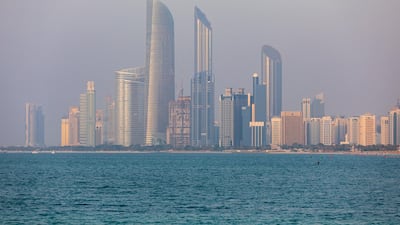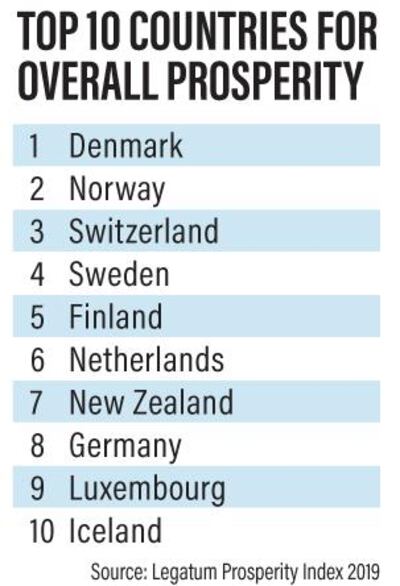The UAE is once again the most prosperous Arab nation and retained its rank in the global top 40 through continued improvements in its business environment, according to the latest Legatum Prosperity Index published on Monday.
The prosperity index, in its 13th year, assessed how well 167 countries promote the economic and social well-being of their residents in three domains: inclusive societies, open economies and empowered people.
"It reaches beyond the financial into the political, the judicial and the well-being and character of a nation," said Philippa Stroud, chief executive of London think tank Legatum Institute. "The top 40 most prosperous nations are those that have demonstrated over time how to build prosperity."
The UAE came in 40th place this year, keeping its spot in the top 40 for the fifth year in a row. A decade ago, it was 44th. It scored particularly well in the open economies category, which includes the investment environment, enterprise conditions, market access and infrastructure, and economic quality.
"[The Emirates] took a deliberate decision … to develop a good investment environment, deregulate businesses, invest in infrastructure and focus on really making sure the fundamentals of the economy are working well," Stephen Brien, director of policy at Legatum Institute, told The National.
“That really shows through in the open economies domain, where the UAE comes in at 26, having risen 10 places over the last decade,” he added.
Within the open economies category, the UAE is third globally for the most flexible business regulations.
The country has been diversifying its economy and implementing business-friendly reforms, including the introduction of long-term visas up to 10 years and decreasing the costs of setting up enterprises. It has allowed 100 per cent foreign ownership of companies in 13 sectors from manufacturing to renewable energy.
In the Legatum ranking’s inclusive societies category, which includes safety and security, personal freedom, governance and social capital, the UAE came in 65th. It came in 50th place in the empowered people category, which includes living conditions, health, education and natural environment.
Improvements in the Emirates since 2009 include a jump in primary education to 48th from 91st. "That's a successful push there," says Mr Brien.
Globally, 148 out of 167 countries are experiencing higher levels of prosperity than a decade ago. The increase has been driven by more open economies due to improvement in the investment environment and digital connectivity. Health, education and living conditions have also improved, but weaker personal freedom and deteriorating governance are setbacks.
In the Mena region, Saudi Arabia has improved its prosperity over the past decade to 71st from 85th. The kingdom recently was the top improver in the World Bank's Doing Business 2020 report, jumping 30 spots from last year, as it carries out reforms to attract investment and diversify beyond oil.
Of the 19 countries that experienced a deterioration in global prosperity over the past decade, 15 are in Sub-Saharan Africa or the Mena region, mainly due to geopolitical conflicts and civil unrest. Syria (157th), Yemen (166th) and Venezuela (143rd) have seen the greatest declines.
Mr Brien says the prosperity index “allows countries to place themselves on an international spectrum and to see where their real strengths and weaknesses are”.
Denmark topped this year's prosperity index, ranking in the top 10 for every pillar and for having the best living conditions. The top 10 countries for overall prosperity were nearly all in Europe, including number two Norway, which topped last year's index, as well as Switzerland, Sweden, Finland, the Netherlands, Germany, Luxembourg and Iceland. New Zealand, which took seventh position, was the only exception.



